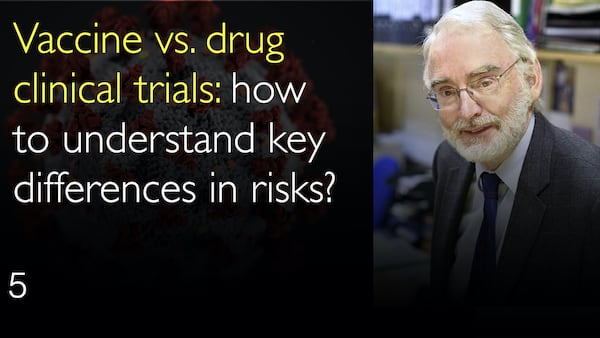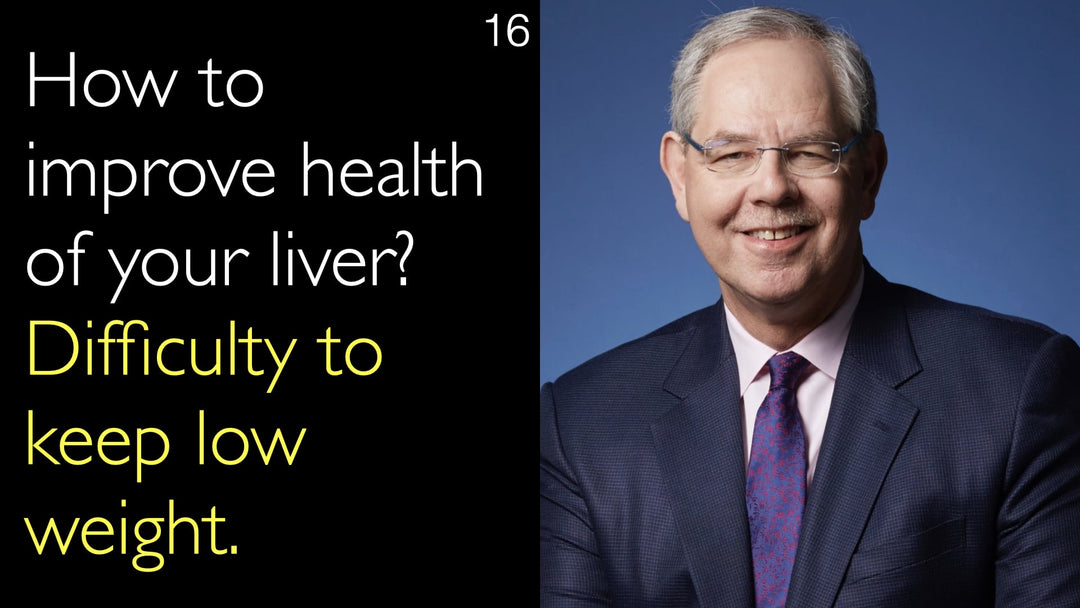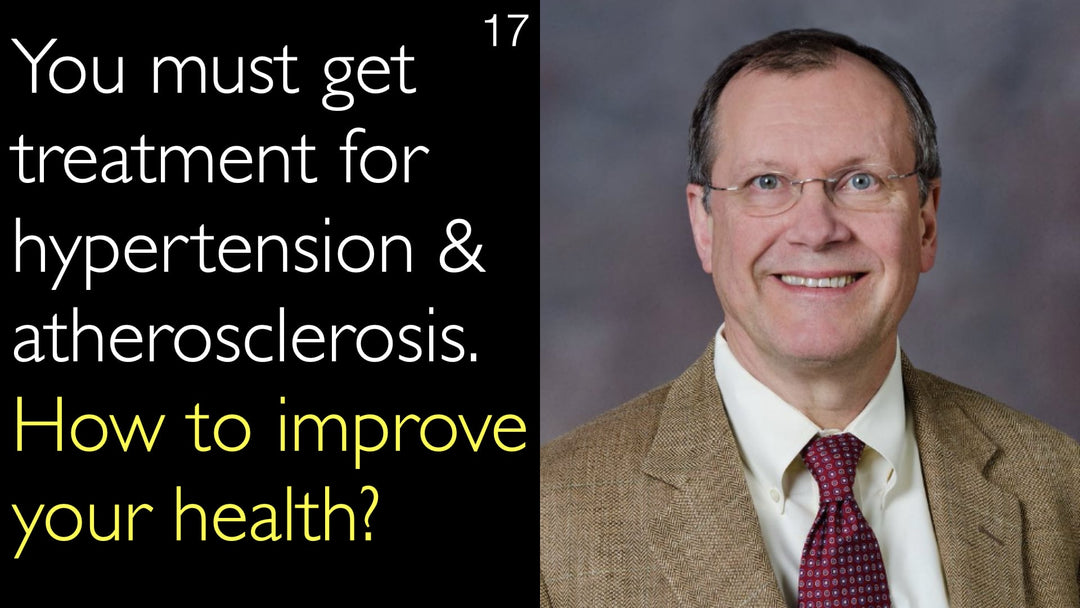Leading expert in clinical trial analysis and pharmacovigilance, Dr. Stephen Evans, MD, explains the key differences between vaccine and drug clinical trials. He details how vaccines are tested in large numbers of healthy individuals, including children. Dr. Stephen Evans, MD, highlights the critical focus on minimal harm and the use of immunogenicity as a surrogate outcome. He contrasts this with drug trials, which often involve older, sicker patients and measure more frequent disease outcomes.
Key Differences Between Vaccine and Drug Clinical Trials: Safety and Design
Jump To Section
- Vaccine Trials in Healthy Populations
- Measuring Vaccine Efficacy Outcomes
- Immunogenicity as a Surrogate Endpoint
- Large Sample Size Requirements
- Drug Trial Patient Populations
- Tolerability of Adverse Effects
- Full Transcript
Vaccine Trials in Healthy Populations
Dr. Stephen Evans, MD, emphasizes a fundamental distinction in clinical trial design. Vaccine trials are primarily conducted in healthy individuals. This population often includes healthy children. The primary goal is to confer protection against a future disease while causing minimal harm.
The safety threshold is exceptionally high because the intervention is given to people who are not currently sick. Common minor adverse effects include a localized rash or a sore arm at the injection site. The ethical imperative is to avoid causing significant harm to a healthy person.
Measuring Vaccine Efficacy Outcomes
Dr. Stephen Evans, MD, explains the challenge in measuring a vaccine's true effectiveness. Vaccines aim to prevent a disease that may be relatively rare in the population. This rarity makes it difficult to design a trial that directly observes a reduction in disease cases within a feasible timeframe and size.
Consequently, trialists must often rely on alternative, measurable outcomes. These outcomes act as proxies for proving the vaccine will work in the real world. This is a key difference from many drug trials that treat an existing, active condition.
Immunogenicity as a Surrogate Endpoint
A critical method for evaluating vaccines is measuring immunogenicity. Dr. Stephen Evans, MD, defines this as the body's ability to produce specific antibodies against the target virus or pathogen. Demonstrating a strong antibody response is considered a reliable surrogate endpoint for protection.
This evidence is usually convincing for regulatory approval. It indicates the vaccine has successfully "trained" the immune system. This approach is necessary when the actual disease outcome is too infrequent to measure directly in a trial.
Large Sample Size Requirements
The need to detect rare adverse events and sometimes use surrogate endpoints demands very large trials. Dr. Stephen Evans, MD, notes that vaccine trials require massive numbers of participants. This large scale is essential to have enough statistical power to identify even very uncommon side effects.
Finding these rare safety signals is paramount when administering a product to millions of healthy people. Large sample sizes help ensure that the benefit-risk profile is thoroughly understood before widespread use.
Drug Trial Patient Populations
Dr. Stephen Evans, MD, contrasts vaccine trials with those for therapeutic drugs. Drug trials typically enroll older patients who already have a diagnosed disease or condition. The participants are unwell, and the drug is intended to treat their illness or alleviate symptoms.
The frequency of the disease outcome under investigation is often higher than the disease a vaccine prevents. This can sometimes allow for relatively smaller trial sizes compared to vaccine studies. However, preventive drugs like statins also require very large trials to measure infrequent events like heart attacks.
Tolerability of Adverse Effects
The tolerability of adverse effects differs significantly between these two trial types. Dr. Stephen Evans, MD, states that healthy people will not tolerate adverse effects easily. A minor side effect in a drug trial might be acceptable if it balances against treating a serious illness.
The same side effect in a vaccine given to a healthy person could be deemed unacceptable. The risk-benefit calculus is entirely different. The interview with Dr. Anton Titov, MD, clarifies that safety is the paramount concern in any clinical trial involving healthy populations.
Full Transcript
Dr. Anton Titov, MD: Professor Evans, what is the difference between the trials for vaccines and clinical trials for medications? You are an expert in clinical trial analysis and, in particular, surveillance for the adverse drug effects of those medications that are already in the market. So how do you make that difference between conducting clinical trials for vaccines and medications?
Dr. Stephen Evans, MD: There are two or three things that make vaccine trials different. Firstly, as I've already said, vaccines tend to be given to healthy people. Very often, of course, they're given to healthy children. You definitely do not wish to give healthy children adverse effects, so you are looking to find benefits with very minimal harms. We won't have no harm.
If you give a vaccine, you can very easily get a rash or a sore arm, and that's an adverse effect of the vaccine. Occasionally they cause more serious harms, and you need to be sure that those harms aren't occurring. But the problem is that they are there to prevent a disease, so you need to be sure that they will prevent that disease.
Very often, the disease is fairly rare itself, so you can't always be absolutely sure that they will prevent the disease. You have to measure a different sort of outcome. You very frequently measure what is called immunogenicity in a vaccine, and that is that you are measuring the ability of the body itself to produce antibodies to the disease or the virus that you are trying to prevent causing significant harm in people.
Instead of demonstrating truly that you prevent the disease, you show that the body has got antibodies against that disease. That is usually fairly convincing. Even then, you very often need very large numbers.
The key things are: we need large numbers in vaccine trials, we're giving them to healthy people, we can tolerate very few adverse effects, and sometimes it's difficult to measure the outcome. For drugs, very often when we're giving them for treatment to people, we're giving them to older people. We're not necessarily giving drugs to children; we're giving them to people with diseases.
The occurrence of the disease or the outcome that you're interested in is sufficiently frequent that you do not need such large trials. For example, with trials of statins, where you give them to people to prevent heart attacks or death, you need very much larger trials of those drugs. Healthy people will not tolerate adverse effects nearly so easily.







